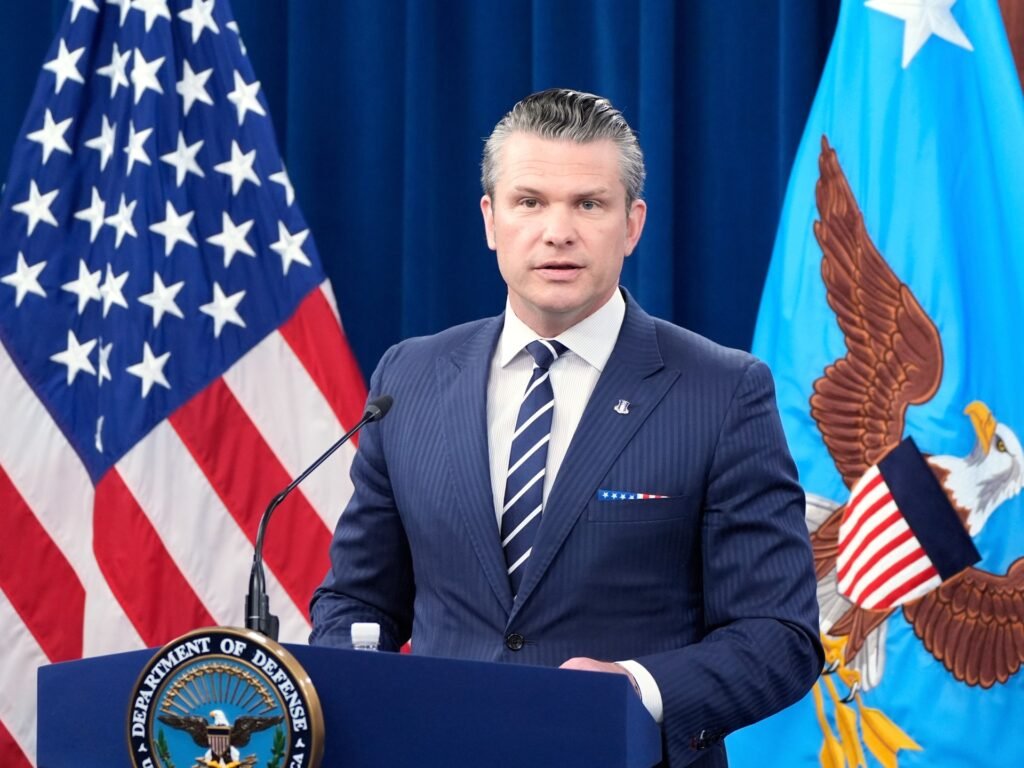US Vice President JD Vance and Defence Secretary Pete Hegseth stated that the US is not aiming to overthrow the Iranian government through “regime change” and is not engaged in war with Iran, following a surprising overnight assault on three of Iran’s nuclear facilities.
These statements were made on Sunday after the US joined Israel in targeting its long-time adversary, with Iran responding through daily counterstrikes, now ongoing for ten days.
Vance claimed that the US has effectively hindered Iran’s nuclear program and mentioned that President Donald Trump is now focusing on finding a diplomatic resolution.
During an appearance on NBC News’ Meet the Press with Kristen Welker, Vance emphasized that the US is “not at war with Iran; we’re at war with Iran’s nuclear program.”
“We don’t want to prolong or escalate this situation. Our goal is to end their nuclear program,” Vance remarked, adding: “We’re open to discussions with Iran for a long-term resolution.”
Hegseth stated that recent US strikes have severely damaged Iran’s nuclear program, reiterating that Washington does not aim for “regime change” in Tehran.
There has been no independent confirmation regarding the extent of damage to the targeted sites or the impact on Iran’s nuclear efforts, which Iran maintains are solely for peaceful uses.
The Defence Secretary urged Iranian leaders to seek a way out of the conflict after Trump announced attacks on significant underground uranium enrichment facilities at Fordow, as well as sites in Isfahan and Natanz.
During a Pentagon press briefing, Hegseth clarified that the operation “did not target Iranian troops or civilians.”
“I can only confirm that we are sending both public and private messages through various channels to the Iranians, encouraging them to engage in discussions,” Hegseth added during a news conference with General Dan Caine, the chairman of the US Joint Chiefs of Staff.
“This mission was always about eliminating the nuclear threat, not regime change,” he stated.
Iranian Foreign Minister Abbas Araghchi asserted that the US strikes have ended any chances for diplomacy and hinted at potential retaliation.
In an address at an Organisation of Islamic Cooperation (OIC) meeting in Istanbul, Araghchi described the US attack on Iran’s nuclear facilities as crossing “a significant red line.”
Trump’s involvement – despite his previous promises to avoid endless military engagements – threatens to escalate the situation, especially after Israel’s unprecedented bombing campaign against Iran, with Tehran asserting it would respond if the US became involved.
Prior to the Israeli attack, the US and Iran were engaged in several rounds of nuclear negotiations facilitated by Oman.
‘Bombers launched from US’
General Caine confirmed alongside Hegseth that evaluating the damage at Iran’s nuclear installations would require time.
“I think the preliminary damage assessment is still pending, and it’s too early for me to speak about what remains there,” he indicated. He confirmed that B-2 bombers were deployed from the US on a Friday mission lasting 18 hours to reach their targets.
“Operation Midnight Hammer” involved various “deception and decoy” tactics, with high-speed suppression fire used to shield the B-2s. Caine stated there’s no evidence that “any shots were fired” from Iranian defenses.
“Iranian fighter jets did not engage, and it appears that Iran’s missile systems did not detect our presence,” Caine said.
When asked about protecting US troops in the Middle East from possible Iranian retaliation, he refrained from providing details.
“Our joint forces are prepared to defend the United States as well as our personnel and interests in the region,” Caine confirmed.
Reporting from Washington, Al Jazeera’s Alan Fisher noted that Hegseth clearly communicated that this operation is not open-ended, although it carries a warning that, while limited, the US military’s capabilities are extensive.
“It’s evident this was a coordinated operation,” Fisher stated.
“As indicated by the chairman of the Joint Chiefs of Staff, full intelligence from the site is still awaiting assessment, which will take time,” Fisher remarked. “So they remain uncertain whether it has been a major success. However, it does convey a strong message.”
Additionally, US Secretary of State Marco Rubio stated to CBS that there are currently no planned military operations targeting Iran.
‘No casualties’ at Iranian sites
Trump declared that US forces successfully targeted three Iranian nuclear sites in what he described as a “very successful attack” that occurred overnight into Sunday.
“We’ve carried out our very successful attack on three nuclear facilities in Iran, including Fordow, Natanz, and Isfahan,” Trump shared on Truth Social.
This escalation, where Trump joined Israel in its military efforts against Iran, raises the stakes of an already tense situation, risking a potential all-out regional conflict.
The head of Iran’s Red Crescent Society, Pir Hossein Kolivand, indicated that there were no casualties reported from the US attacks on the nuclear sites, as per Iranian state media.
On Saturday, Iranian President Masoud Pezeshkian asserted that the country’s rights to pursue a civilian nuclear program “cannot be erased by threats or warfare.” Iran denies aspirations for an atomic weapon.
Trump’s rhetoric against Iran has intensified since Israel first targeted Iran on June 13, as he reiterated that Iran should never possess nuclear capabilities. Although he seemed unsure about military action, Israeli Prime Minister Benjamin Netanyahu reportedly influenced his decisions.
In an interview with Al Jazeera, Scott Lucas, a professor of US and international politics at University College Dublin, stated that Trump’s choice to attack Iran – after initially opting for diplomacy – was a result of being “played by the Israelis; some might even say manipulated.”


